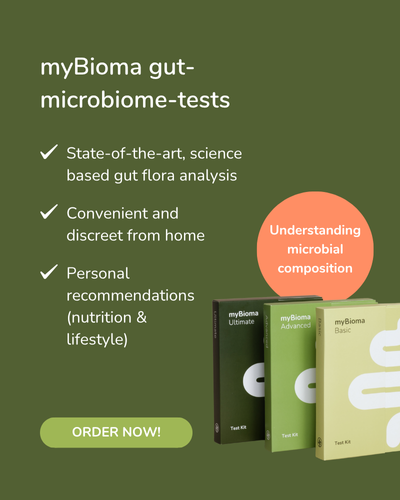Each of us is aware of how important exercise is for our health - but the fact that exercise also has a positive effect on our microbiome and, above all, how it has been the focus of science for some time now.
Sport, exercise and your gut flora - how are they connected?
As new reports show, sport and exercise also influence our intestinal flora.
Sport and short-chain fatty acids:
In some studies, researchers were able to prove that exercise increases the number of butyrate-producing bacteria and thus the bacterial metabolite butyrate, which was subsequently linked to increased cardiorespiratory fitness. Butyrate is a short-chain fatty acid obtained from bacterial fermentation of dietary fiber. It increases the proliferation of intestinal mucosa cells and thereby the barrier function of the intestinal wall. It also helps regulate the immune system and gene expression (conversion of genetic information into cellular structures and functions).

Although several studies have now shown that exercise alters the composition, functionality and metabolites of the gut microbiota, the effects of different exercise frequencies, modes and intensities are unknown. Assessing the effects of exercise on the gut microbiota in different populations and its synergy with different diets also represents a focus of future research.
Mechanisms that lead to a change in the gut microbiome
What mechanisms are set in motion with sport or exercise that can change your gut microbes?
Immune system and inflammation:
There is also lymphatic tissue in the intestine, which houses around 70% of all immune cells in the body. Several studies have been able to prove that exercise increases the gene expression (conversion of genetic information into cellular structures and functions) of intraepithelial lymphocytes (immune cells in the intestinal mucosa), as well as the downregulation of inflammatory cytokines (regulatory proteins for the growth and differentiation of body cells). non-inflammatory cytokines and antioxidant enzymes.
Improvement of the intestinal barrier:
Exercise reduces intestinal blood flow by more than half, resulting in significant intestinal ischemia (reduced blood flow) that occurs within 10 minutes of high intensity exercise. However, this will be canceled immediately as soon as you are back in the rest phase. Exercise therefore represents a stress factor for the intestines, stimulating positive adaptations and improving the long-term resilience of the intestinal barrier.
Optimisation of the gut environment:
Altered gut motility or activity of the enteric nervous system is another mechanism through which exercise may influence the gut microbiome. Exercise shortens transit time in the colon and has been shown to speed up the movement of gas through the gastrointestinal tract. Changes in gastrointestinal transit thus have profound effects on intestinal pH, mucus secretion, biofilm formation and the availability of nutrients to the microbiome.
Bile acid regulation:
Another mechanism is that exercise training changes the circulation of bile acids. Bile acids are powerful regulators of the gut microbiome and a lack of these molecules is associated with significant changes in the composition of the flora, which can lead to an imbalance of bacteria in the gut (gut dysbiosis).
Metabolism:
Finally, exercise significantly alters metabolic flux (the rate of turnover of molecules through metabolic pathways) and requires contraction of skeletal muscle, resulting in the release of myokines (hormone-like messengers released by mammalian muscles during exercise and contraction), metabolites, and neuroendocrine hormones which can interact directly or indirectly with the intestine via a common interface with the immune system.
Stress-related changes in the microbiome not only affect the gut, but also the entire body (e.g. protection against colon cancer, inflammatory bowel disease, obesity, metabolic diseases and increased mental and cognitive health). Physical activity protects against many chronic diseases and is an attractive and cost-effective way to improve quality of life.

Proposed model for how exercise alters the gut microbiota and intestinal epithelium, with potential implications for human health. Exercise also provides benefits for overall body physiology and protects against colon cancer, inflammatory bowel disease (IBD), depression and anxiety.
Overall, increasing data suggests that regular exercise has a positive impact on the gut microbiome. This area of research will undoubtedly see exciting developments in the coming years and there are many questions that still need to be answered.
So, how about going for a bike ride or a little walk in the beautiful summer weather to positively support your microbiome? ? Have you actually had it tested yet?
References
- Exercise and the Gut Microbiome: A Review of the Evidence, Potential Mechanisms, and Implications of Human Health. Mailing LJ, et al. Exercise and Sport Science Reviews 47(2)75-85, April 2019.







